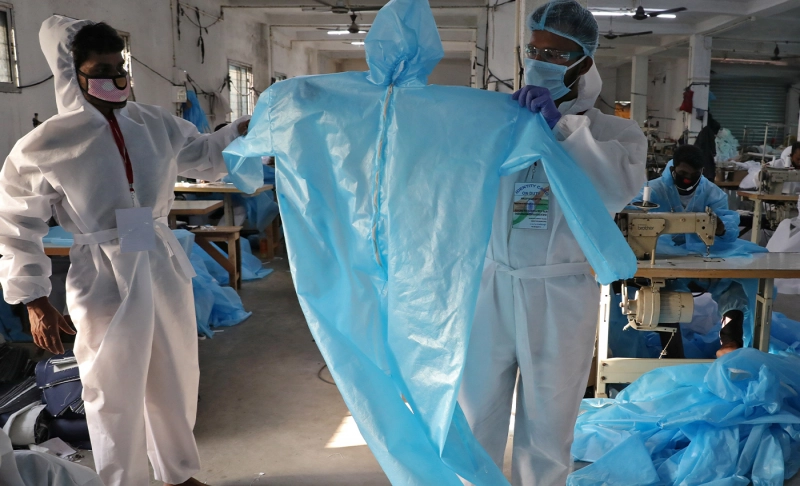By: Devika Kandelwal
December 16 2020
False: PPE is not effective against COVID-19.

The Verdict False
Using appropriate PPE kits, washing your hands, and maintaining social distancing can substantially decrease the risk of transmission.
Using appropriate PPE kits, washing your hands, and maintaining social distancing can substantially decrease the risk of transmission.According to the U.S. Food and Drug Administration (FDA), personal protective equipment (PPE) is designed to create a non-disease specific barrier to penetration of substances, solid, liquid, or airborne particles. In general, neither the FDA nor the manufacturer can provide assurances that PPE will protect someone against a specific disease. The data that the FDA uses for the evaluation and clearance of PPE rarely includes performance evaluation or testing against specific viruses. Therefore, it is important to note that the use of PPE alone will not fully protect someone from acquiring an infection or passing an infection to another person. Other infection control practices, such as hand-washing, using alcohol-based hand sanitizers, isolating patients, and properly covering coughs and sneezes, are also important steps to minimize your risk of infection. According to a study published in the Lancet, which was partly funded by the World Health Organization (WHO), using face masks and eye protection and keeping one meter apart from others could be the optimal way to reduce the spread. However, it also notes that none of these interventions give complete protection from the infection. Some of the findings around PPE are supported by low-certainty evidence, with no completed randomized trials. Studies focussing on eye protection found that face shields, goggles, and glasses were associated with a lower risk of infection compared with no eye covering. Still, the authors note that the certainty of the evidence for eye coverings is low. The studies examining the use of facemasks found that the risk of infection was also lower (3 percent compared to 17 percent when not wearing a mask) but was based on evidence of “low certainty”. For healthcare workers, N95 and respirator masks might be associated with greater protection from viral transmission than surgical masks or similar. For the general public, face masks are also associated with protection, even in non-health-care settings, with either disposable surgical masks or reusable 12-16 layer cotton ones. Another study published in the British Journal of Nursing states that "staff working without appropriate PPE, or using PPE inappropriately, are at significant risk of infection, potentially increasing transmission, and leading to reduced workforce capacity and potentially higher mortality." Proper training and adequate PPE kits are essential in mitigating the risk of transmission. According to a study published in October 2020, providing adequate PPE "for all health care workers around the world requires an initial investment of billions of dollars, but the returns on that investment could be close to 8000% in productivity gains." The study was published in the open-access journal PLOS ONE by Nicholas Risko of the Johns Hopkins University School of Medicine and colleagues. Their model predicted that an initial global investment of $9.6 billion U.S. could save the lives of roughly 2.2 million health care workers by providing adequate PPE kits. The COVID-19 pandemic has given rise to a lot of potentially dangerous misinformation. For reliable advice on COVID-19 including symptoms, prevention, and available treatment, please refer to the World Health Organisation or your national healthcare authority. The COVID-19 pandemic has given rise to a lot of potentially dangerous misinformation. For reliable advice on COVID-19 including symptoms, prevention and available treatment, please refer to the World Health Organisation or your national healthcare authority.


